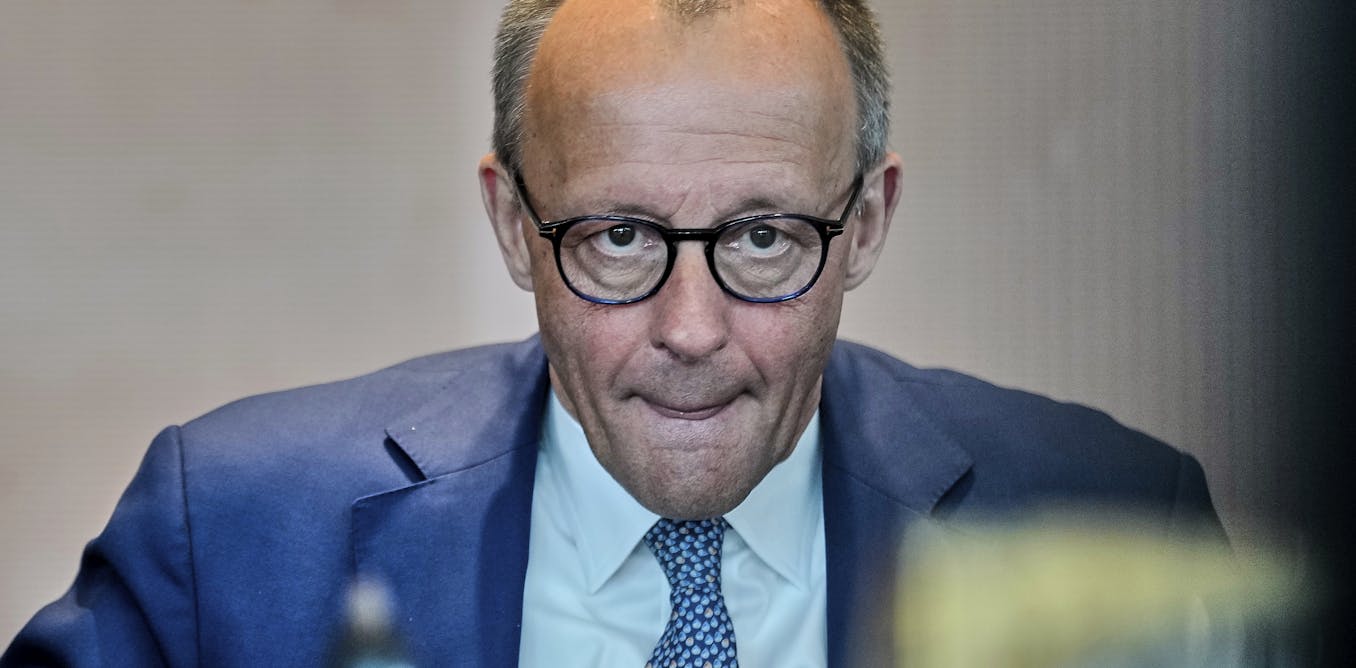In response to a report on the virulence of antisemitism in Germany, Chancellor Friedrich Merz recently cast the blame on attitudes held by immigrants.
Merz stated in a Fox News interview that Germany has “imported antisemitism with the big numbers of migrants we have within the last 10 years.”
Merz is pointing to a real and pressing issue. Yet his emphasis on so-called “imported antisemitism” serves as a convenient diversion from Germany’s persistent failure to confront home-grown antisemitism.
His remarks also risk emboldening those who weaponize antisemitism as a rhetorical tool to fuel anti-immigrant sentiments.
Antisemitism in Germany
Antisemitic incidents in Germany have been on the rise since the Oct. 7, 2023 attack on Israel by Hamas and the subsequent war in Gaza.
According to a survey by the Research and Information Centre on Antisemitism (RIAS), antisemitic occurrences rose by more than 80 per cent in 2023. That year, 4,782 occurrences were documented, the highest number since the organization began tracking such cases in 2017.
However, RIAS’s most recent report found that the primary motive behind antisemitic crimes remained right-wing extremist ideology (48 per cent). It also noted that, since 2023, there has been a marked increase in incidents attributed to “foreign ideology.” These are understood as originating outside Germany and often linked to Islamist or anti-Israel sentiments, which accounted for 31 per cent of cases in 2024.
It should be noted that RIAS’s approach to classifying antisemitism has been subject to controversy, especially with regard to its treatment of criticism of or protest against the Israeli government’s actions.
(AP Photo/Markus Schreiber)
The ‘imported antisemitism’ narrative
A recent survey of antisemitic attitudes among immigrants in Germany found that such attitudes are more prevalent among Muslim respondents compared to their Christian or religiously unaffiliated counterparts. The study revealed particularly high levels of antisemitism among individuals from the Middle East and North Africa.
Approximately 35 per cent of Muslim respondents — especially those with strong religious convictions and lower levels of formal education — “strongly agreed with classical antisemitic statements.” These statements reflect classical antisemitic tropes, such as attributing too much influence over politics or finance to Jews, accusing Jews of driving the world into disaster or relativizing the Holocaust.
At the same time, there is evidence that immigrants successfully integrating into German society is associated with lower levels of antisemitism.
Yet blaming a rise in antisemitism on “imported” attitudes or “foreign ideologies” signals a crude simplification. Antisemitism has remained prevalent in German society even after the Second World War, and political movements or leaders can easily mobilize it.
Although Holocaust education is mandatory in German schools, knowledge about the Shoah and the legacy of antisemitism remains limited among younger generations. A recent study by the Jewish Claims Conference found that among Germans aged 18 to 29, around 40 per cent were not aware that approximately six million Jews were killed by the Nazis and their collaborators.
According to a 2023 MEMO survey, more than 50 per cent of 14- to 16-year-old students in Germany did not know what Auschwitz was.
Blaming immigrants for challenges in Germany’s memory culture oversimplifies a deeper issue: the growing difficulty of making the country’s dominant remembrance — centred on the horrors of the Nazi dictatorship and the Holocaust — politically meaningful and emotionally resonant for younger generations.
For many young Germans, the memory of the Holocaust feels increasingly remote, lacking the emotional immediacy that vanishing eyewitnesses once provided.
This problem is further exacerbated by the absence of innovative, impactful teaching capable of conveying the continued relevance of Holocaust memory and its political message.
In a 2023 article, American journalist Masha Gessen highlighted how Holocaust remembrance in Germany was becoming an elite-driven ritual, one that risks preventing a meaningful connection between its moral imperatives and today’s political realities.
The threat from Alternative for Germany

(AP Photo)
At the same time, the rise of the far-right Alternative for Germany (AfD) party poses a direct threat to Germany’s culture of remembrance.
The AfD has made it a central objective to challenge the primacy of Holocaust memory, calling for a U-turn in Germany’s remembrance culture.
Leading party members have labelled Holocaust memorials “monuments of shame,” reflecting the party’s broader effort to promote nationalist reinterpretations of history.
Furthermore, the AfD’s staunchly anti-immigrant stance exposes a fundamental flaw in the imported antisemitism narrative. Across Europe, populist right-wing movements have increasingly mobilized anti-Muslim rhetoric under the banner of defending so-called “Judeo-Christian values,” even as they simultaneously draw on classic antisemitic tropes targeting “globalist elites” and conspiratorial power structures.
This use of Jewish identity as a rhetorical weapon against Islam, while perpetuating antisemitism in other forms, reveals the deep contradictions and opportunism underlying imported antisemitism claims.
Blaming Muslim immigrants for the rise of antisemitism offers German political leaders a convenient excuse for their own failure to confront entrenched antisemitic beliefs within German society.
In addition, Holocaust remembrance can sometimes exclude immigrants. For example, Germany recently added questions about the Holocaust and Nazi crimes to its citizenship test, committing newcomers to its memory culture.
Research shows this kind of policy can have unintended effects. It can make immigrants feel excluded if they are seen as not fully sharing in “our” nation and “our” history. Given the universalist values it is meant to embody, the commemoration of the Holocaust can also serve to alienate immigrants from full cultural citizenship.
Framing antisemitism primarily as an imported problem risks strengthening those forces that actively seek to undermine and ignore Germany’s confrontation with its Nazi past.
Instead, what is needed is a more nuanced approach, one that bridges the divide between antiracist and anti-antisemitism efforts, and aligns more faithfully with the moral and political commitments that this collective memory is meant to uphold.



